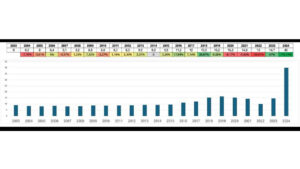The report “Turkish Drone Industry“, published by the Drone Observatory, examines the development of the Turkish drone industry and the expansion of the Turkish drone market in the Middle East and surrounding regions. Turkey’s leadership in the drone market is in line with Turkey’s ambitions for regional hegemony, but poses risks to regional political stability as drones enable new types of conflict.
The report comes at a time when Turkey has increased its drone production by more than tenfold over the past decade, making it the world’s leading seller of this type of weapon. However, efforts to develop and produce drones are not separate from Turkey’s political strategy of becoming a dominant power in the Middle East region and expanding its own sphere of influence outside the region. Using a combination of diplomatic, commercial and political means, Turkey has been able to sell its own drones to states and militaries in Eastern Europe, the Middle East and dozens of African states. Since 2020, Turkey has dominated the drone market.
Meanwhile, on the African continent, dozens of conflicts between states and local militias have used drones. These facts reflect the reality that Turkey’s drone diplomacy could have a negative impact on political stability, questioning Turkey’s commitment to lasting peace and calling for its enthusiasm for the drone industry to be interpreted in the light of its hegemonic ambitions.
In the section on ‘Turkey’s strategic context’, the report signals that after 2016, Turkey has taken “an openly more aggressive stance in its immediate environment, as well as towards its international partners”. Turkey has intervened “in the Middle East (against the Syrian Kurds), in North Africa and on energy issues in the Eastern Mediterranean (in opposition to Marshal Haftar in Libya) or in the Caucasus (through its support for Azerbaijan against Armenia)”. As the report explains, Turkey’s stance is in line with its ambition to become a hegemonic power in the region. In this context, Turkey’s military expenditure has increased over the past decade.

The authors make it clear that the Turkish state has helped the drone industry to penetrate the market of foreign states by “using [Turkey’s] soft power as much as hard power, to enabling delegations of Turkish entrepreneurs, both civil and defence, to exploit this external leverage to conquer new market shares.” In particular, the report highlights that Turkey has “signed military cooperation agreements with 30 African states since 2017”.
Turkey’s drone industry is led by two major companies, the privately owned Baykar and the state-owned TAI (Turkish Aerospace Industry). “The influence exerted by each of the companies on the Presidency is crucial,” the report says, despite the companies being in high competition since the 2000s. At the same time, the report notes, “Turkey’s defence budget increased by 150% in 2024 to reach $40.5 billion”, a clear sign of the Turkish state’s involvement in the defence industry. The authors also note the “family relationship between Baykar’s CEO, Selçuk Bayraktar, and the family of President Recep Tayyip Erdoğan (son-in-law)”.
The report lists Baykar’s TB2 and TAI’s Anka-S as the most exported drones. The cumulative total of exported Turkish drones exceeds 400, with exports reaching Africa, the Middle East and Asia, as well as Eastern Europe. Turkey also exported dozens of drones to Ukraine in 2022. “It was decided to build a Baykar production facility on Ukrainian soil, with the idea of getting the produced drones to the front line as soon as possible,” according to an agreement signed in February 2022. It is worth noting that “the majority have been shot down or neutralised electromagnetically”, the report says. Finally, the author estimates Turkey’s drone production at a maximum of 240 units per year, highlighting the 40-fold increase in production capacity between 2014 and 2022.
Other observatories, like Drone Wars, have noted that Turkey has begun exporting drones to dozens of countries around the world, many of them on the African continent. The proliferation of armed drones is reportedly causing many civilian deaths in African states, where conflicts are developing and taking new forms following the availability of drones. Drones have also reportedly been used in Turkey’s neighbour Iraq to carry out attacks against Kurdish civilians. “The increasing proliferation and use of armed drones is largely overlooked,” notes Drone Wars, “As always, it is civilians who pay the price.”
